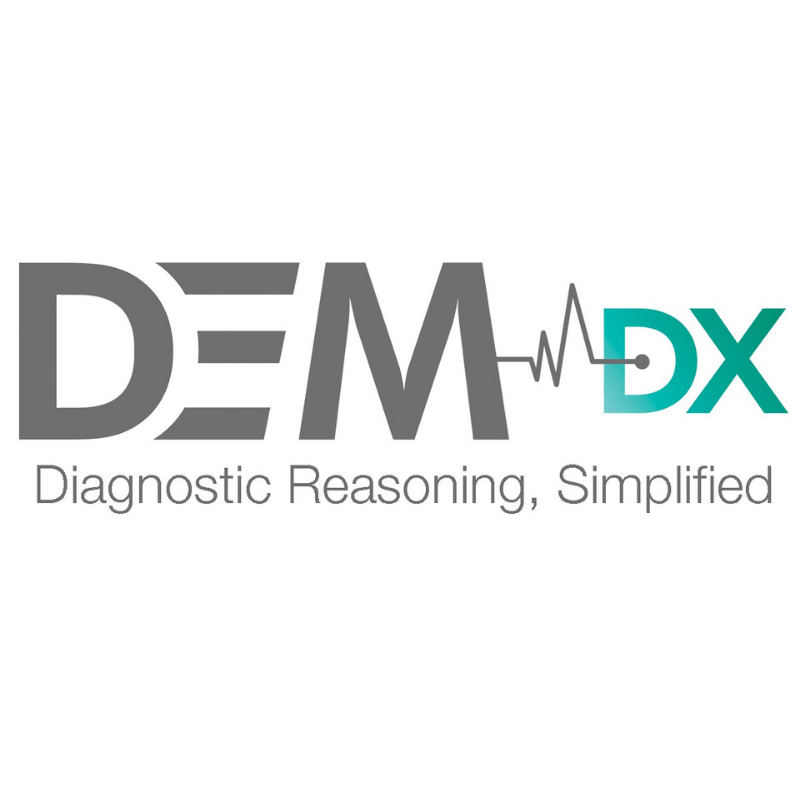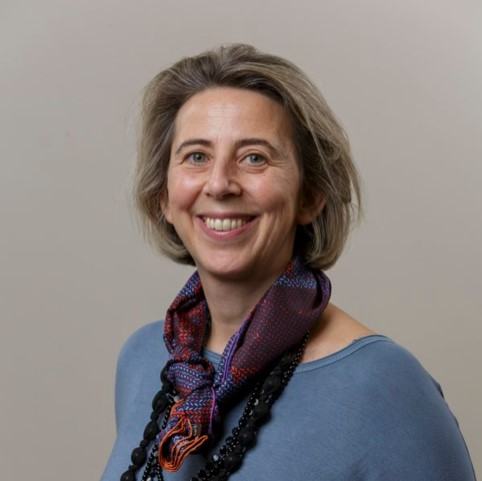
Company of the Month: Dem Dx
Dem Dx is a digital health platform that allows healthcare professionals and students to access tried-and-tested diagnostic reasoning pathways. An alumnus of Angels in MedCity, the company has recently begun a trial to help nurses triage patients in Moorfields Eye Hospital NHS Foundation Trust.
In this interview CEO Dr Lorin Gresser talks about the collaborative spirit that helped develop Dem Dx, the increasing need for diagnostic tools to support healthcare professionals, and how a concept that she devised to meet her own needs as a trainee doctor is now being used in over 160 countries.
Imagine being able to access the knowledge and diagnostic reasoning of hundreds of medical experts from a phone or computer. This, in a nutshell, is was what Dem Dx aims to do for healthcare professionals. Built on the expertise of a community of medical specialists Dem Dx has distilled their knowledge of medical conditions and unpicked the diagnostic steps taken to recognise them. Starting with a patient’s presenting complaint the platform walks the user though a step-by-step process of collecting history, examination and investigation findings to reach a single most likely diagnosis.
Developing Dem Dx
CEO and founder, Dr Lorin Gresser, came up with the concept of Dem Dx when she was in medical school in her late thirties and had to tackle the challenge of translating what she had learnt from text books and lectures into the practical skills of diagnosis.
“So, if you think of reaching a diagnosis like navigating a maze it’s about how do you decide the right route to take,” she explains. “When you become a specialist this all becomes unbelievably intuitive so you can easily navigate the part of the maze that you know, whether that’s cardiology, respiratory or ophthalmology. It’s a skill that specialists develop and refine but when you are a GP or junior doctor you need to know all the different mazes, which is where Dem Dx comes into play.”
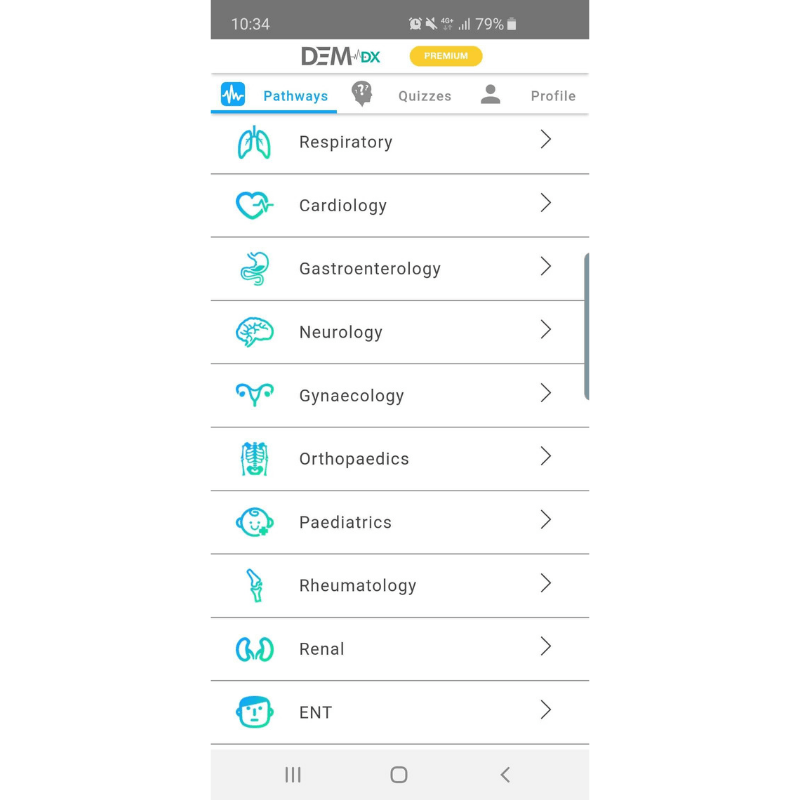
During her time at King’s College London medical school Lorin became aware of the divide between educational tools that define conditions and the skills needed to recognise them in a clinical setting. She set out to devise a tool to help bridge this gap and enable healthcare workers to learn diagnostic skills.
Part of the power of Dem Dx is making users really think about the diagnosis they are making in the situation where the case presents itself. By bringing together the collective knowledge of so many experts we can inject some objectivity to the decision making of the individual, Lorin Gresser
The pivotal moment came, when she shared her idea with senior physicians and doctors. Their level of enthusiasm and endorsement motivated her to develop the concept further and she founded the company in May 2015. Since then Dem Dx has built a community of registrars, professors and consultants and tapped into their expertise to tease out their reasoning processes and place them on a digital platform.
“Building the Dem Dx community has been an unbelievably organic process,” says Lorin. “In medicine there is this ethos of shared learning and this ambition to give the best possible care to patients which made building our community more straightforward.”
The platform and its users
When the user accesses the Dem Dx platform, they have a choice of 14 medical specialties and from there they can build a diagnostic picture of the patient from the symptoms they present and their history. Users can mine deeper for further details such as examination results or appropriate investigations associated with those presentations and conditions or to take ‘quizzes’ to put their diagnostic skills to the test.
“Dem Dx is anchored in the reality of how a patient would actually present with a problem,” says Lorin. “Which, for a diagnostic tool, is both novel and powerful. More and more, I think we are seeing education become case based or problem based. The fact that we have already developed a tool with this approach is really helpful.”
Originally the target audience for Dem Dx was doctors but its user-base is now much broader and includes advanced nurse practitioners, junior doctors, pharmacists, healthcare workers and many more. Lorin is clear that Dem Dx is designed for healthcare professionals and not the general public but, within that group, the use is very dependent on need. “It is the situation that dictates who uses Dem Dx,” she says. “And not the person or their title.”
Moorfields Eye Hospital NHS Foundation Trust Trial
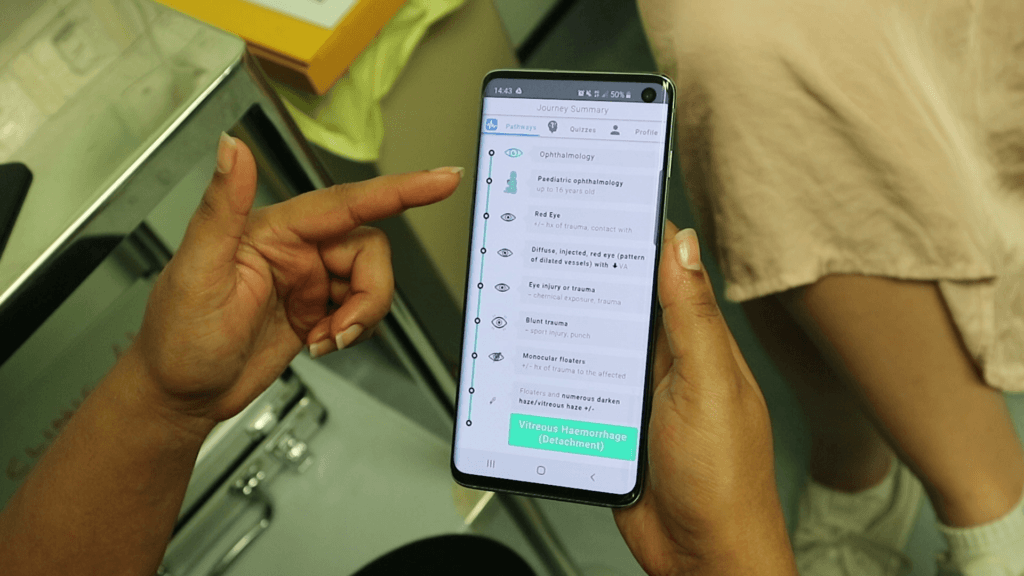
Dem Dx has a number of institutional partners who are using or trialling the platform for a range of professional groups and for different applications. Earlier this year the company announced the trial at Moorfields Eye Hospital NHS Foundation Trust which is funded by Innovate UK through the Digital Health Technology Catalyst Round 2.
Over 18 months, the trial will evaluate the use of Dem Dx to support 13 nurses to triage conditions such as conjunctivitis, cellulitis and acute onset squints in children which was a process historically performed by ophthalmologists. By using Dem Dx the aim is to increase the confidence of nurses and enable them to direct patients more efficiently. “Some triaging tools are just checklists,” says Lorin. “But Dem Dx provides the context so that users understand why they are asking the questions. So far the feedback is that the nurses feel both supported and empowered.”
The trial is collecting qualitative data on the nurses’ experience of using the platform alongside quantitative data on the extent to which nurses are triaging and the level of doctor involvement.
Alongside this, the trial will mine over one million anonymised clinical records to support the development of machine learning within the Trust. By looking at data on symptoms and diagnosis the research aims to assess whether professionals are considering the right signs for diagnosis with the goal of optimising the accuracy and relevance of clinical advice provided to paediatric nurses.
“We are the only diagnostic triage platform that is using machine learning in an open transparent way,” says Lorin. “The distinction being that other machine learning projects do not try to analyse the process that happens within the ‘black box’ of the machine. They identify associations, but don’t analyse why they’re there. What we are going to do is compare the outputs of the machine learning to what the consultants have said so we can augment the existing pathways built by professionals, in order to create a more refined and accurate diagnostic pathway.”
The machine learning aspect of the trial will be a collaboration between in-house expertise from Dem Dx and specialist partners from academia, industry and the NHS.
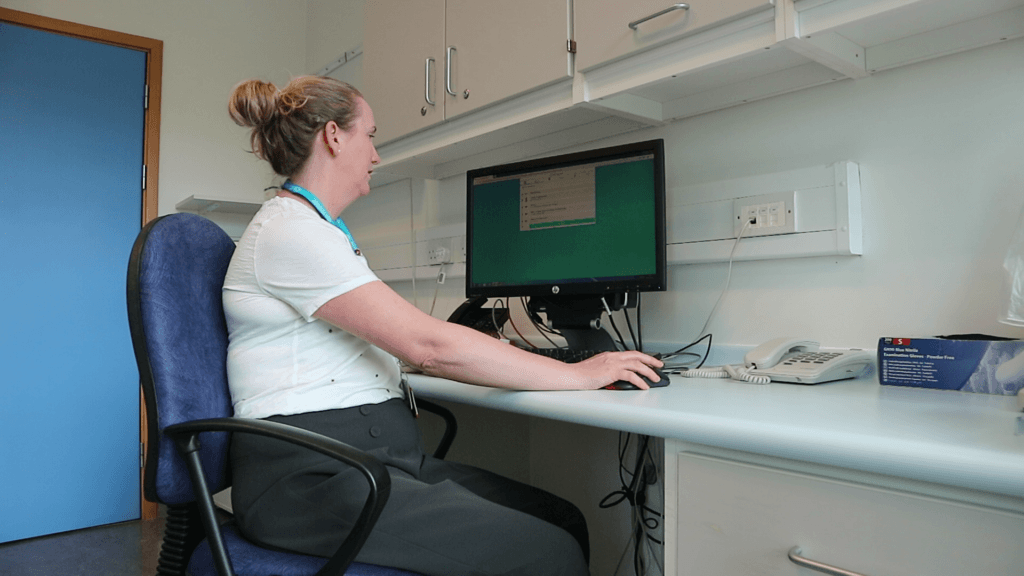
Evidence for digital health
Lorin is a strong believer in the importance of evidence and the company is constantly testing and curating the platform, alongside conducting independent validations. “We need a strong evidence base not just for our comfort and our product,” says Lorin. “But it’s also critical for business development. Quite rightly, medical professionals and managers will only make decisions if they have a high level of evidence.”
Previous to the Moorfields trial, the platform was assessed by Imperial Medical School students, who concluded that students using Dem Dx were twice as accurate in their diagnoses of paediatric cases compared to students using other clinical diagnostic tools.
The important result from these trials is not that we are better than healthcare professionals at diagnosis, but that those using Dem Dx will be more efficient and more comprehensive, Lorin Gresser
Further afield the platform has been evaluated using anonymised clinical records from the Emergency Department of Beth Israel Hospital, Boston, USA and with junior doctors in remote areas of Brazil. “It’s interesting that the research shows the platform is just as effective in a large city hospital as it is in remote areas,” says Lorin.
When thinking about the global reach of Dem Dx another valuable aspect of the platform is that it brings a level of objectivity to a diagnosis. Lorin provides examples where doctors have travelled abroad and because they have learnt and practised within a specific geographic area or culture, they do not intuitively pick up on conditions which are more common in the country they are visiting. “Part of the power of Dem Dx is making users really think about the diagnosis they are making in the situation where the case presents itself. By bringing together the collective knowledge of so many experts we can inject some objectivity to the decision making of the individual.”
London ecosystem and opportunities
Dem Dx was founded in Clerkenwell in Central London and remains based there. Lorin is a keen advocate of the strength of the life sciences ecosystem in London and the Greater South East and aware of opportunities that present themselves to a healthcare start-up that is based here. “London is a fantastic location for a start-up like us,” she says. “It’s got key hospitals, excellent networks and a wonderful ecosystem of clinical, academic and technical expertise. Outside of the region, I think it’s much harder to make the necessary connections and to find the right talent.”
MedCity create those situations where you bump into the right person and start those conversations that eventually lead to something bigger. It’s difficult to measure but it’s so important, Lorin Gresser
In its earlier days Dem Dx was part of the Angels in MedCity programme and Lorin believes the company benefitted both from being part of a start-up community but also through the opportunities provided to pitch and present at events. “It was great to feel that MedCity had our back in terms of business development opportunities and providing us with the right exposure,” she says. “Often organisations like MedCity don’t get the recognition they deserve because it’s difficult to define their impact, but they provide the matrix that brings start-ups together and the right medium for companies to grow. They create those situations where you bump into the right person and start those conversations that eventually lead to something bigger. It’s difficult to measure but it’s so important.”
To get all the latest news, updates and interviews from MedCity sign up to our monthly newsletter.
